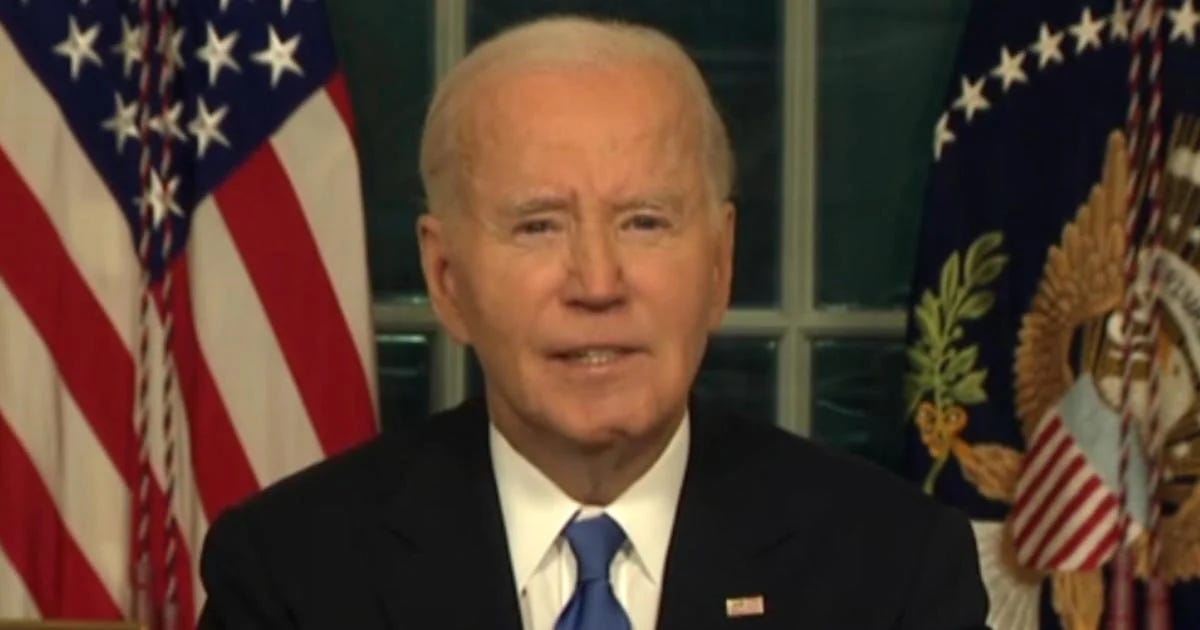Giving his farewell address to the nation on Wednesday night, Joe Biden also delivered a requiem for the fantasies of the “resistance.”
At its commanding heights, the anti-Trump “resistance” relied upon a partnership between two factions: the embattled establishment and progressive accelerationists. The conditions of the partnership were relatively clear. Accelerationists had carte blanche on social policy in exchange for support for the establishment’s preferred interventions abroad—basically, a fusion of the 1619 Project and Beltway nostrums about the “liberal international order.” The terms of the anti-Trump bargain on economics were more fluid, but they settled on expanded social programs financed by deficit spending for the interim. (As a concrete mechanism for forming this coalition, social dynamics played a major role. Doubting its own credibility, the Boomer leadership of many center-left institutions has been cowed by new hires, who are often more stridently left-wing. This is how you get interns and fact-checkers essentially dictating editorial policy at many elite media outlets.)
This was a fundamentally unstable and incoherent mixture. The assertion that the United States was conceived in slavery and is committed to racism today topples any case for a Wilsonian foreign policy. If American history is a stain to be erased from the public square, why should Beltway policymakers presume to take the lead in world affairs? The delegitimization of the United States also debases the political capital for robust internationalism. When the Washington establishment endorses (or refuses to criticize) progressive plans to nuke the filibuster in the Senate and pack the Supreme Court, it vitiates its own argument that Trump should be opposed for the sake of “norms.” The domestic fallout from the Israel-Hamas war distilled that deeper tension, as the pathologies of loathing cultivated by the domestic “reckoning” were turned on Israel and Jewish people more generally. The apologia for Hamas’s slaughter of Israeli civilians is the antithesis of “rules-based international order” beloved by the Beltway.
This bizarre synthesis can also be seen in analogical mania of academic accounts of contemporary politics, in which Trump is like George Wallace is like Charles Lindbergh is like Jefferson Davis is like Vladimir Putin is like Adolph Hitler. By this frantic concatenation, normie Republican voters are basically Nazis. Here again, contradictions lurk beneath the surface. Donald Trump is presented simultaneously as a break from the Republican mainstream (a concession to the establishment) and the culmination of the Republican tradition (catnip for progressive culture warriors).
The tensions of this alliance broke the Biden presidency and ensured the continued viability of Donald Trump. Immigration vaulted Trump to the center of American politics in 2015, and Biden turbocharged immigration as an issue by systematically deconstructing border controls. The result has been a humanitarian disaster and a tremendous political boon for Trump himself. Throughout his presidency, Biden elevated Trump as a political foil—a useful tactic to rally the anti-Trump alliance around its nemesis but also a way of bolstering Trump’s presence in the public square. Despite the mythology of “Joe from Scranton,” Biden’s administration promulgated hard-edged identity politics throughout the federal government. Even beneficiaries of the CHIPS semiconductor program are tasked with formulating “diversity, equity, and inclusion” policies. Instead of delivering “normalcy,” he promoted escalated civic conflict. The unprecedented wave of legal warfare launched against Trump and some high-profile surrogates sets a grim precedent for future presidents.
Joe Biden entered office with the narrowest of electoral mandates: relying on under 50,000 votes in crucial swing states, garnering a wafer-thin majority in the House, and mustering a 50-50 Senate only after Republicans threw away two races in Georgia. Yet Biden catered to accelerationists at every turn. (Imagine if George W. Bush in 2002 had called for the nuclear option on the filibuster to pass a nationwide abortion ban while also dispatching the FBI to prosecute the leadership of the ACLU.) A more vigorous Biden could have executed a more targeted left-populist pivot by expanding some domestic programs while also maintaining border controls. Instead, he accepted the framework of the 2020-era anti-Trump coalition, even as the imperatives of that alliance sent his presidency careening off the tracks.
The contradictions of the anti-Trump coalition hamstrung Kamala Harris’s presidential bid. The demands of a resurgent left prompted Harris to go full-spectrum maximalist progressive during her failed 2020 run for the presidency. Decriminalize illegal immigration. Ban fracking. And internal-combustion-engine automobiles. And private health insurance. As rioters torched American cities in the wretched summer of 2020, Harris encouraged people to donate to a fund to bail out arrested protestors.
Those past positions added more than a few suitcases to the pile of baggage from Biden’s record. While Harris used aides to distance herself from her past policy positions, she was often unable or unwilling to explicitly break from those positions in her own voice, let alone explain why she has changed.
A veteran of California politics, Harris understood the contours of the anti-Trump bargain and thus has aimed to minimize anything that could disappoint the accelerationist left. The fact that such an accelerationist program has fallen out of fashion with the overall electorate prompted her campaign to adopt a debilitating vacuousness. She could not fully break with the progressives who hoped to use anti-Trumpism as a way of immanentizing the eschaton, but she could not openly endorse those positions, either. Hence, the vibes ruled, and Harris lost.
The frustrations of the “resistance” indicate a deeper crisis of the elite during the age of populism. Rather than seeing populists as political actors to be bargained with and populism itself as a sign for a needed political correction, many American elites have instead been tempted to cast populism as an existential political threat—a danger requiring apocalyptic confrontation rather than the engagement of normal democratic politics.
On a level of raw politics, this approach has obviously undermined itself. But it poses civic dangers, too. One of the greatest sources of resilience for democratic politics is the ability to accommodate a range of stakeholders and channel contention into a political union. The attempt to forge a coordinated “whole of society” alliance against populism is instead in tension with democratic contestation as well as the civil liberties that undergird it. If the people are victim to “disinformation” and ugly bigotry, then perhaps democratic contestation itself needs to be curtailed. That might explain why many opponents of populism have turned to the court system—the branch of government most insulated from democratic pressures—as a way of adjudicating political differences.
In Why Liberalism Failed (published in 2018 but drafted before then), Patrick Deneen offered a prescient diagnosis of the temptation some of the political establishment would face: succumbing to a kind of state-of-emergency liberalism.
Contemporary liberalism will increasingly resort to imposing the liberal order by fiat—especially in the form of the administrative state run by a small minority who increasingly disdain democracy. End runs around democratic and populist discontent have become the norm, and backstopping the liberal order is the ever more visible power of a massive “deep state,” with extensive powers of surveillance, legal mandate, police power, and administrative control.
This in many respects was the project of the “resistance.” For the sake of “Our Democracy,” unprecedented powers had to be given to a prosecutorial elite to wage legal war against populists. A novel, “self-executing” interpretation of the 14th Amendment would allow functionaries to toss people off the ballot. White House bureaucrats would pressure technology companies to become vast engines of censorship. Traditional limits on power—such as the Senate filibuster—had to be bulldozed for the sake of revolutionary urgency. Running an op-ed from a sitting U.S. senator would cause a national newspaper to meltdown. Problematic art had to be destroyed, and anyone who failed to mouth the latest revolutionary bromide would be cast out into the darkness. The president would claim the unilateral ability to “affirm” some amendment to the Constitution.
This project leaves a legacy of ashes. Despite wearing the mask of responsibility, the politics of crisis often licenses irresponsibility—as the horn of “emergency” looses its blower from all restraints. An eight-year crusade of detonating norms to “save the norms” has in fact widened the field of political combat. The “resistance” has been a political failure and a cultural dead end.
After this cultural ice age, some envision a thaw—maybe even a new spring. The playwright and novelist Matthew Gasda hopes that “2024 is a moment like 1830: a time of transformative technology, elite failure, populist revolution, intellectuals turning toward the romance of the frontier.” Vladimir and Eugene Kontorovich invoke an “American glasnost.” I’m from New England, so I know all about false thaws and springs. Winter may yet endure, and some of this will depend upon the political choices of the new administration.
Nevertheless, we should hope for something better—for an opening to recover the inner resources of liberty, the American republic, and our fellow citizens.
A few other updates:
I’m pleased to join the roster of contributors to Commonplace, a new magazine published by American Compass. The launch issue has some great material—on travel teams, remote work, the meaning of the realignment, and the grindset.
Speaking about why Silicon Valley flipped: An interview with Marc Andreessen by Ross Douthat.
An info-rich McKinsey report on depopulation.
I’ve written about the civic opportunity of America 250, and this guy is hoping to write a symphony to commemorate that anniversary.




